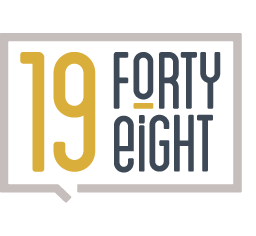When we think about communication, we often focus on how we speak or present. But one of the most underrated and powerful aspects of communication is listening. At 1948, we know that real communication doesn’t begin when you start speaking, it begins when you start listening.
Just like public speaking or writing, listening skills aren’t something you’re simply born with — they can be learned, practiced and mastered. Through the right communication skills training, anyone can become a better listener.
Listening vs Hearing
First, let’s get clear on the difference.
Hearing is passive. It’s simply perceiving sound. Listening is active. It’s an intentional process of concentrating on and processing what another person is saying — both the words and the meaning behind them.
Too often, we think we’re listening when we’re really just waiting for our turn to speak. Effective communication skills training teaches you how to break this habit and truly tune into the other person.
Why Listening Skills Matter
In any professional or personal environment, listening is not just about being polite — it’s about building stronger, more effective connections.
Here’s why developing strong listening skills should be a top priority:
- It builds trust. When people feel heard, they feel valued. Trust grows naturally.
- It reduces conflict. Many workplace disputes aren’t caused by disagreements — they’re caused by misunderstandings.
- It sharpens your leadership. Great leaders listen more than they speak.
- It gives you a competitive advantage. Whether you’re negotiating a deal, coaching a team, or selling a product, the person who listens best often holds the most influence.
At 1948, we see listening not as a “soft skill,” but as a core strength developed through focused communication skills training.
Can Listening Skills Really Be Taught?
Absolutely.
Like any skill, listening can be improved with the right techniques and consistent practice. It’s about becoming more aware and deliberate in how you communicate.
In our communication skills training sessions at 1948, we often use actor-based techniques to teach better listening. Just like actors must stay fully present with the other characters on stage, great communicators must stay fully engaged with their audience.
Practical Ways to Improve Listening Skills
If you want to become a better listener, or help your team strengthen their communication, here are some practical techniques that we use:
- Teach Active Listening
Active listening means showing the speaker that you are fully engaged. This includes:
- Summarising what you’ve heard (“So what you’re saying is…” “It sounds like…”)
- Asking clarifying questions to deepen understanding (“Can you give me an example? What data supports this?”)
Practicing active listening creates a powerful feedback loop where people feel heard — and are then more willing to listen to you.
- Encourage Presence
True listening only happens when you’re fully present. That means:
- Putting away devices
- Making consistent eye contact
- Focusing not just on the words, but on body language, tone, and emotion
- Not interrupting the other person
Presence is a simple but profound skill and it’s at the heart of all our communication skills training at 1948.
- Train Interpretation Skills
Listening isn’t just about what is said, it’s about what is meant.
Learn to tune into:
- Tone of voice
- Facial expressions
- Body posture
- Pauses and silences
Often, the most important messages are the ones that aren’t spoken directly.
- Use Listening Exercises
At 1948, we often use practical exercises in our communication skills workshops to build better habits, such as:
- Paraphrase Challenge: After someone speaks, summarise their message in your own words without adding your opinion.
- Silence Practice: Pause for three seconds before responding to anyone. It’s uncomfortable at first, but it forces you to fully process their words.
- Question/Answer: Asking a question that only builds upon the previous answer given.
- Set Listening Objectives
Actors often set an objective before every scene (“Make the other person laugh,” “Get them to agree with me”).
You can do the same with listening: set an intention before a meeting, such as “Understand their concerns fully” or “Pick up on unspoken tensions.”
This simple mental shift can transform your conversations.
Listening: The Secret Strength of Great Communicators
In today’s fast-paced world, truly attentive listeners are rare — and incredibly powerful.
When you listen deeply, you don’t just gather information. You create connection, trust and influence.
At 1948, we believe that great communication is teachable — and listening isone of the key lessons to learn. Our communication skills training is designed to help individuals and teams unlock the hidden power of great listening, leading to better relationships, clearer collaboration and stronger leadership.
Because in communication, it’s not just about what you say. It’s about how well you listen.
Visit our website or get in contact here if you’d like to know more.


